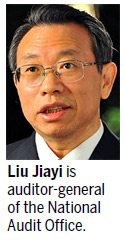Audits boost 'immunity' to economic illness
Updated: 2010-12-22 07:27
By Wang Huazhong (China Daily)
|
|||||||||||

BEIJING - If we think of China as a healthy body, then Liu Jiayi would be in charge of the immune system.
The auditor-general of the National Audit Office (NAO) described China's auditing system as the country's "immune system", which helps check and stem irregularities -- before, during and after they occur.
The system can safeguard the healthy operation of the economy and society, optimize the institutional and legal framework and solve problems by disclosing and punishing irregularities, he said.
"Auditing shoulders a great responsibility to drive forward the development of democracy and a legal framework," Liu said. "Audits should focus on disclosing and punishing irregularity and crimes and play a full role in the fight against corruption," he added.
However, Liu did not enjoy much of a smooth start when he was appointed in March 2008.
What Liu faced then was a Chinese economy hit by the emerging global financial crisis, astronomical investment to stimulate growth, critical relief funding after the 8.0-magnitude earthquake in Sichuan province and the heyday of China's Olympic dream coming true - all auditing projects that have been put under spotlight.
Then 52, the auditor-general, who believes that "the ultimate goal of auditing is to safeguard people's fundamental interests", had to trudge forward with understaffed auditors against the backdrop of a lagging development of the legal framework.
While most countries have on average 10 auditors for every 100,000 people, China has only 6 auditors for every 100,000.
Due to a lack of personnel, auditors can only audit 15 percent of the 150,000 organizations and institutions that must be audited by law.
Moreover, "audit officers must resist the lure of higher positions and pay offered by other organizations and companies," Liu said.
In recent years, the NAO has stepped up efforts to disclose audit results and maintained 60 percent annual growth in terms of information disclosure.
The report submitted to the National People's Congress this year came with a 420-page disclosure document detailing the violators and their specific violations.
Liu said national auditors have checked 720,000 organizations and projects over the past five years, saving State spending and increasing State income by more than 317 billion yuan ($47.6 billion) and avoiding economic losses of 54.6 billion yuan.
Calculated this way, "1 yuan invested in auditing can result in 20 yuan of returns", Liu said.
The NAO also audited economic responsibilities of 160,000 government officials, which led to 4 percent of them ending up with administrative or judicial punishment.
"Auditing has played an effective role in improving the liability system, prompting officials to practice in line with laws and cost-effectively," Liu said.











